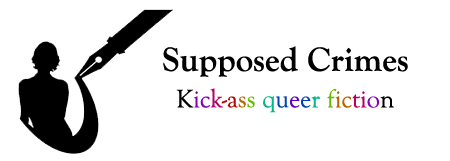
I recently finished a novel in which the author addressed bi-antagonism directly between the two main characters. When I went to post my review, I was surprised to find that a few people found that aspect of the book distasteful. It led me to wonder to what extent we should include queer antagonism as part of a story and in what ways it should appear.
That wasn’t the only type of antagonism I’ve read lately. It came on the heels of finishing a book in which both characters are gay, but one of them has a problem with how the other expresses himself. A good number of books in my personal e-library include coming out to homophobic family members and/or friends.
In real life, none of these things are uncommon. I’ve certainly faced my share of anti-bi attitudes, especially among other readers of lesfic. I once participated in a Q and A session about bisexuality that left me thinking the person who invited me was intentionally setting me up.
In one memorable experience, I had a “friend” tell me that by coming out as bisexual, I was admitting to being a satan-worshipping lesbian. I am not at all sure how he arrived at that conclusion, and his strange beliefs are more amusing than upsetting. But I have also lost relationships over it, and I know there are people praying for my “lost soul."
Besides some readers being frustrated that antagonism is included at all, some are equally disappointed that some authors leave room for growth. In both of the novels I mentioned above, the main characters move past their prejudices to develop romantic relationships. In some books, homophobic families learn and change in order to stay in the lives of the main characters.
So how much should we include in fiction? That seems to be a matter of personal taste, whether on the part of an author or a reader. Some folks want to feel less alone, even when reading to escape. Others prefer to be drawn into a book to remove themselves from painful real world situations.
There’s no right answer to the question. I do tend to lean away from writers using it as a crutch if there’s no substance to the rest of the story; it doesn’t make a compelling primary plot. Pressuring or expecting LGBTQ+ people to make the first move or accept unaccepting family members also seems like an inappropriate call if the story veers that direction. And I also politely urge non-queer authors from using it as a form of character development, as they’ve never personally experienced it. Aside from that, though, it remains up to authors to decide and readers to choose to read or not.
What do you think?
